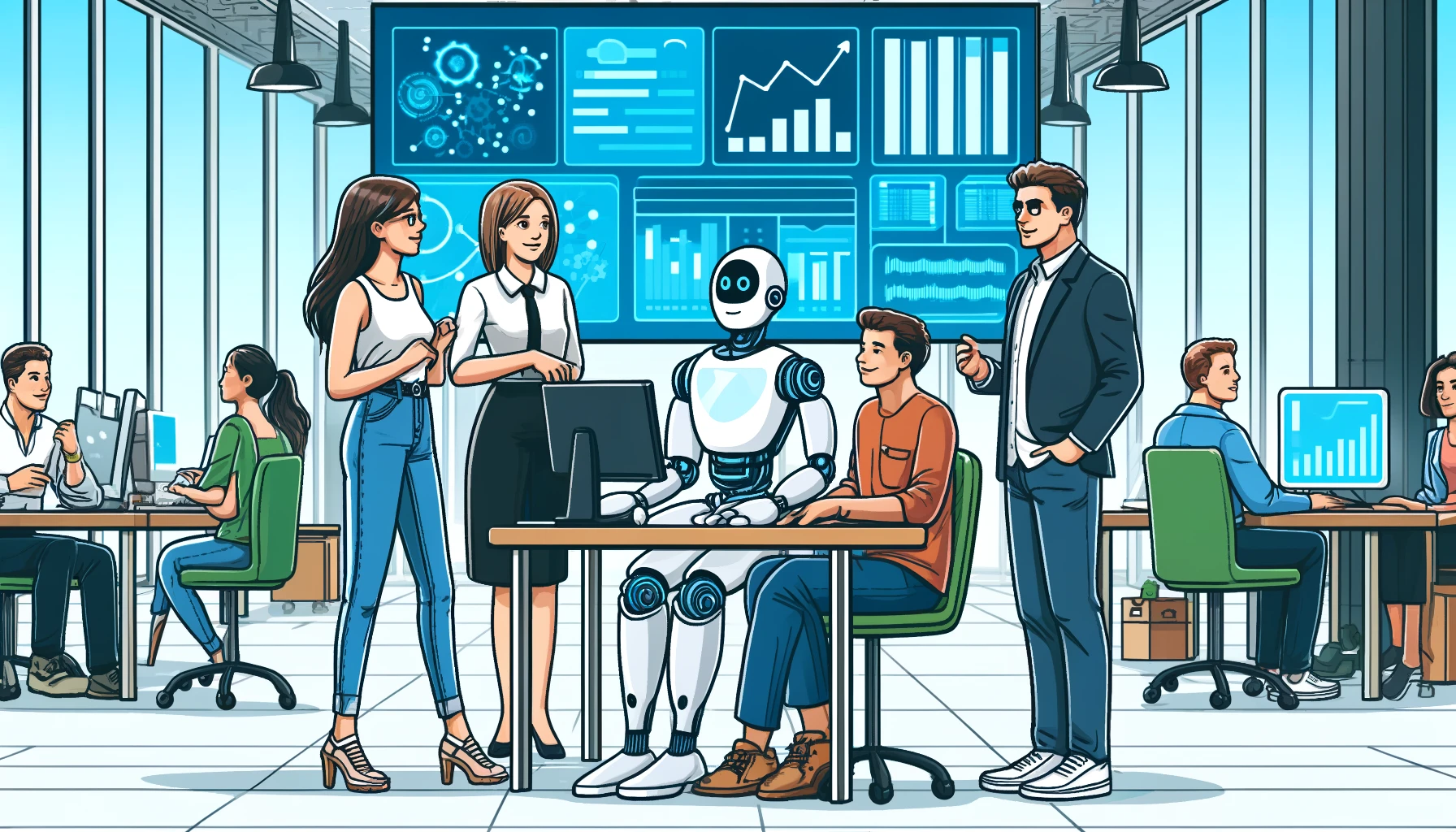[image]
Did you know that businesses using AI for project management report a 25% increase in productivity? This staggering statistic underscores a seismic shift in how companies are streamlining their processes.
As project environments become more complex, the traditional tools often fall short in addressing the dynamic demands of modern project management. This is where AI steps in, revolutionizing not just the workflow but the very fabric of planning and resource allocation.
Today, let’s delve into the myriad of ways AI is enhancing project planning and resource allocation, reshaping the landscape for project managers and teams across various sectors.
AI’s role in project management is growing increasingly indispensable as it automates critical processes and provides key insights that drive decision-making.
From small startups to large enterprises, the adoption of AI tools is proving to be a game-changer, ensuring projects are delivered efficiently and effectively.
For those looking to elevate their project management game, implementing an AI sales automation tool might just be the stepping stone needed to harness the full potential of AI.
Join us as we explore how artificial intelligence is not only meeting but exceeding the expectations in project management, setting new benchmarks in productivity and innovation.
Optimizing Task Allocation and Resource Management
Efficient task allocation and resource management are the backbones of successful project management. But how exactly are these areas being transformed by AI?
Let’s explore how AI-driven innovations are making waves, paving the way for smarter and more effective project handling.
AI-Driven Task Allocation: Matching Tasks Perfectly
Imagine a world where every task is matched perfectly with the team member most suited to handle it. That’s the world AI is creating in modern workplaces. By utilizing advanced algorithms, AI systems analyze the skills, experience, and current workload of each team member to assign tasks in the most efficient way possible.
This not only maximizes individual productivity but also enhances the overall workflow. No more guessing games or manual spreadsheets; AI handles the complexity of task distribution with ease, ensuring the right person is always on the right job.

Predictive Analytics in Resource Management: Staying Ahead of the Curve
Staying proactive rather than reactive in resource management is critical, and AI is the key to making this shift. Through predictive analytics, AI tools can forecast the future needs of a project in terms of manpower, materials, and time.
By analyzing past project data, these tools identify trends and patterns that inform smarter resource allocation. This foresight helps prevent resource overallocation or shortages, which can derail project timelines and inflate budgets.
For instance, if an AI system predicts a high demand for developers in the next phase of a software project, managers can plan recruitment or training ahead of time, rather than scrambling at the last minute.
These AI enhancements in task allocation and resource management are not just about doing things faster, but also about doing them smarter.
By integrating these technologies, businesses are able to streamline their operations and focus more on strategic growth and less on routine logistics.
The ways AI is enhancing project planning and resource allocation are clear: it’s turning the daunting task of project management into a more manageable and predictable process.
Advancing Decision-Making with Data Analytics
In the complex world of project management, making the right decision at the right time is crucial, and here’s where AI-powered data analytics steps in to shine a new light on decision-making processes.
Let’s delve into how AI is streamlining decision-making in project management.
The Role of Data Analytics in Strategic Planning
Data is the new gold in the digital age, especially when it comes to strategic project management. AI leverages this wealth of data by providing comprehensive analytics that help project managers make well-informed decisions.
These AI systems process vast amounts of data at unprecedented speeds, offering insights that were previously either difficult to obtain or took too long to gather. For instance, AI can analyze the performance data of current projects to predict outcomes and suggest adjustments in real-time.
This means project managers can shift strategies quickly and efficiently, staying always one step ahead of project needs.
Predictive Analytics for Risk Management
Risk management is an essential aspect of project management, and predictive analytics is revolutionizing this domain. By harnessing the power of AI, project managers can now anticipate potential risks before they become problematic.
AI algorithms sift through historical project data to identify patterns and predict future challenges. This proactive approach allows teams to create effective mitigation strategies and allocate resources wisely, ensuring smoother project execution.
For example, if predictive analytics indicates a likely delay in a phase of the project due to resource shortages, managers can preemptively adjust schedules or secure additional resources before the issue impacts the project timeline.
This not only helps in maintaining momentum but also reduces the stress associated with last-minute crises.
Through these advanced capabilities, AI is enhancing the ways project managers plan, execute, and monitor projects. By transforming data into actionable insights, AI is not just supporting but actively improving decision-making in project management.
As we integrate more AI tools into our processes, the potential for refined and optimized project outcomes grows, highlighting the transformative impact of AI on project planning and resource allocation.

Enhancing Communication and Collaboration
Clear communication and effective collaboration are pivotal in any project’s success. With the advent of AI, the way teams communicate and collaborate has seen a significant overhaul.
Let’s explore how AI is fostering better connections and streamlining collaborative efforts in project management.
AI-Powered Communication Tools: Streamlining Interactions
In the fast-paced environment of project management, every second counts. AI-powered communication tools are revolutionizing how project teams interact. These tools, such as AI-driven chatbots, integrate seamlessly into communication channels, providing real-time updates and responses.
This means less time spent on routine inquiries and more time for critical thinking and problem-solving. For example, a chatbot can instantly inform team members about changes in project scope or deadlines, ensuring everyone is always in the loop without delay.
These smart tools also analyze communication patterns to suggest improvements. They can identify bottlenecks where messages pile up or where miscommunications frequently occur, allowing managers to address these issues proactively.
This not only keeps the project on track but also enhances the team’s overall efficiency.
Automation in Collaboration: Enhancing Team Dynamics
Beyond just improving communication, AI is instrumental in refining collaboration among team members. AI technologies can automate routine collaborative tasks like scheduling meetings, setting reminders for deadlines, or generating reports.
This automation frees up team members to focus on more strategic and creative tasks, thereby boosting productivity.
Furthermore, AI’s role in collaboration extends to optimizing how teams work together. Through data analysis, AI tools provide insights into team performance, highlighting successful interactions and pinpointing areas needing improvement.
This continuous feedback loop fosters a culture of continuous improvement, enhancing team dynamics and project success over time.
By enhancing communication and collaboration, AI is not just simplifying interactions but is also building stronger, more cohesive project teams.
The ways AI is enhancing project planning and resource allocation are evident in how smoothly projects can run when everyone is perfectly synchronized and informed.
Predictive Project Planning and Forecasting
Navigating the complexities of project timelines and resources can be daunting, but predictive project planning powered by AI is changing the game. This advanced approach not only forecasts the needs of projects but also ensures that planning is as accurate and efficient as possible.
Let’s break down how AI is redefining project planning and forecasting.
Leveraging AI for Predictive Planning
AI-infused project planning tools utilize machine learning algorithms to analyze vast amounts of data, predicting future project requirements with remarkable precision. These tools consider historical data, current project metrics, and complex variable interactions to forecast project timelines and resource needs.
For instance, AI can predict when a project might need additional team members based on the rate of progress and upcoming project phases. This allows managers to proactively adjust plans, secure necessary resources in advance, and avoid the pitfalls of under or overallocation.
The ability of AI to provide these insights not only saves time but also significantly reduces the costs associated with inefficient resource use.
By anticipating future needs, AI-powered planning tools help ensure that projects are not just completed on time, but are also more likely to stay within budget.
Proactive Risk Management with Predictive Analytics
Another critical aspect of AI in project management is its capability in proactive risk management. Predictive analytics tools scan for potential issues that could impact the project, from delayed deliveries to sudden changes in project scope.
By identifying these risks early, teams can devise effective strategies to mitigate them before they cause significant disruption.
For example, if predictive analytics indicate a potential shortage of critical materials, project managers can source alternatives well in advance. Similarly, AI can alert teams to potential bottlenecks in workflows, allowing for adjustments that keep the project moving smoothly.
Embracing predictive project planning and forecasting means projects are not only managed with a reactionary approach but are guided by foresight and preparedness.
This proactive methodology significantly enhances the ability to manage large-scale projects effectively, making AI an invaluable ally in the quest for perfect project execution.
Agile Adaptation and Continuous Improvement
In the dynamic world of project management, the ability to adapt and continuously improve is crucial for success. AI is playing a pivotal role in transforming Agile methodologies, making them even more responsive and effective.
Let’s explore how AI is facilitating agile adaptation and fostering an environment of continuous improvement.
Integrating AI with Agile Methodologies
Agile project management is all about flexibility and iterative progress through short cycles or sprints.
By integrating AI, these Agile processes become supercharged. AI tools analyze real-time data from ongoing projects to provide insights that help teams adapt their strategies quickly.
This might involve reallocating resources to different tasks based on their current priorities or adjusting timelines to accommodate unforeseen changes.
For example, an AI system might detect that a particular project phase is progressing faster than expected. It can then recommend reallocating resources to another phase that is lagging behind, ensuring the overall project remains on schedule.
This level of dynamic adjustment is what makes AI an invaluable tool in Agile environments, where being able to pivot quickly is a key advantage.
Cultivating a Culture of Continuous Improvement
AI doesn’t just help teams adapt; it also drives them to continuously improve. By gathering and analyzing performance data across multiple project cycles, AI identifies patterns and trends that indicate what’s working and what isn’t.
This feedback is crucial for the iterative improvement process characteristic of Agile methodologies.
Teams can use this data to fine-tune their approaches, streamline processes, and increase efficiency over time. For instance, if AI analytics show that certain meetings are consistently unproductive, teams might revise their meeting formats or reduce their frequency.
Similarly, AI can suggest new collaboration tools or techniques that have proven effective in similar project environments.
The synergy between AI and Agile practices not only enhances project flexibility but also embeds a proactive approach to continuous improvement. The result is a more resilient project management framework that not only adapts to changes but also evolves to prevent future challenges.
Conclusion
The integration of artificial intelligence into project management is more than just a technological upgrade; it’s a strategic revolution.
From optimizing task allocation and resource management to advancing decision-making with data analytics, enhancing communication and collaboration, providing predictive project planning and forecasting, and enabling agile adaptation and continuous improvement, AI is at the forefront of transforming how projects are managed and executed.
Embracing these ways AI is enhancing project planning and resource allocation not only streamlines processes but also boosts efficiency and effectiveness across various phases of project management.






